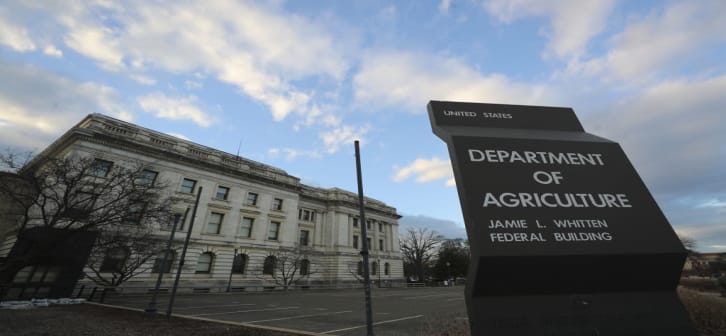USDA Grants $33M to Support Projects at 19 Land-Grant HBCUs
Editor & Writer
Editor & Writer
Editor & Writer
Editor & Writer

- The grants will help fund curriculum design, faculty development, student recruitment and retention, and research.
- There are 19 1890 land-grant historically Black colleges and universities, including private institution Tuskegee University.
- The USDA has a larger system of programs to strengthen research, extension, and teaching in the food and agricultural sciences.
The U.S. Department of Agriculture (USDA) is advancing food and agricultural science at 1890 land-grant universities through a multimillion-dollar grant program.
The USDA on July 24 announced it's investing over $33 million at 1890 land-grant universities for 82 research, extension, and education projects. The projects are part of the USDA National Institute of Food and Agriculture's (NIFA) Capacity Building Grants Program to address national, regional, and multi-institutional agricultural sustainability.
According to the USDA, this is part of a larger system of programs to strengthen research, extension, and teaching in the food and agricultural sciences.
The Capacity Building Grants Program funds curriculum design, material and faculty development, student recruitment and retention, research, and extension.
"The nation's 1890 Land-grant Universities are uniquely positioned to advance fundamental sciences as well as translational research and development in support of agriculture, and this funding will increase their capacity to continue their invaluable work," NIFA Director Dr. Manjit K. Misra said in a press release.
"USDA looks forward to the impact these visionary projects will have in improving the supply of affordable, safe, nutritious and accessible food and agricultural products, while fostering economic development and rural prosperity in America."
What Are 1890 Land-Grant Institutions?
There are 19 historically Black colleges and universities (HBCUs) — including one private institution, Tuskegee University — established under the Second Morrill Act of 1890.
The land-grant system started with the Morrill Land Grant Act of 1862, which established agricultural and mechanical arts colleges. According to the 1890 Foundation, the federal government required these institutions to integrate for federal funding in 1889.
Most states created new agricultural and mechanical arts colleges for Black citizens rather than incorporating them into existing programs, according to the foundation.
"In addition to appropriating funding, a state could escape this provision, however, if separate institutions were maintained and the funds divided in a 'just,' but not necessarily equal, manner," the foundation said. "Thus the 1890 act led to the establishment of land-grant institutions for African Americans."
1890 Land-Grant Institutions and One Project From Each
Alabama
Alabama A&M University
Project: Experiential learning in animal bio-health sciences: processing, formulating, and feeding sustainable animal feed
Tuskegee University
Project: Sustainable plastic alternatives derived from industrial hemp residues for packaging solutions
Arkansas
University of Arkansas at Pine Bluff
Project: Providing experiential learning opportunities and extension training in aquaculture and fisheries to underserved and underrepresented student communities from 1890 land-grant institutions
Delaware
Delaware State University
Project: Food safety, stress, and sleep in diverse communities in the state of Delaware
Florida
Florida A&M University
Project: Building capacity in functional genomics to augment sugar metabolism for improving muscadine grape product characteristics and sustainability
Georgia
Fort Valley State University
Project: Countering the sunflower oil shortage impact on frying oils through oil blending applications
Kentucky
Kentucky State University
Project: Enhancing methods in agricultural and environmental science for the Kentucky state university master of science in environmental studies program
Louisiana
Southern University
Project: An integrated assessment of sweet potato as a functional food: from product development to human health
Maryland
University of Maryland Eastern Shore
Project: Smart-detection and preventive controls: emergent technologies for microbial food safety in soilless leafy greens systems
Mississippi
Alcorn State University
Project: Introducing and integrating stevia into rural Mississippi farm operations to improve community health and income
Missouri
Lincoln University
Project: Building capacity to serve small and medium goat and sheep producers efficiently and effectively by examining the value chain
North Carolina
North Carolina A&T State University
Project: Strengthening the food and nutritional sciences program to create a pipeline for graduate study and a diverse workforce
Ohio
Central State University
Project: Innovative use of a perennial flower species as a new crop to improve honey production while advancing sustainability of agricultural production systems in Ohio
Oklahoma
Langston University
Project: An integrated model for teaching excellence: a learner-centered education in agriculture through culturally relevant engagement partnership
South Carolina
South Carolina State University
Project: Designing a state-of-the-art nutrition and food laboratory system for South Carolina State University
Tennessee
Tennessee State University
Project: Agricultural communications capacity-building through curriculum development, collaboration, and artificial intelligence
Texas
Prairie View A&M University
Project: Student workforce development program promoting experiential learning for the meat and poultry industry
Virginia
Virginia State University
Project: Student experiential learning-internships, professional skills, faculty development in animal and environmental sciences, and climate change
West Virginia
West Virginia State University
Project: Machine-learning approaches for modeling color patterns, and fruit shapes with metabolites for breeding Capsicum chinense peppers
















